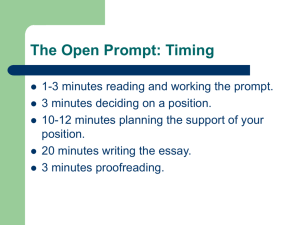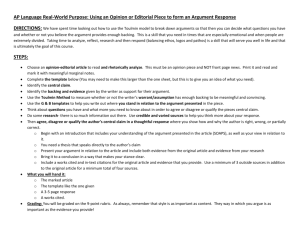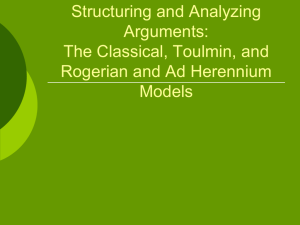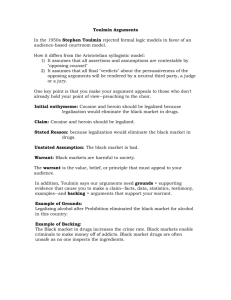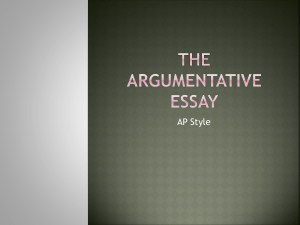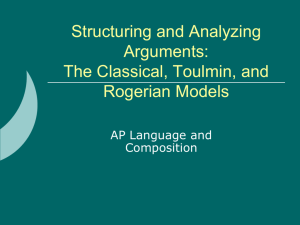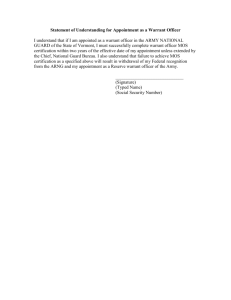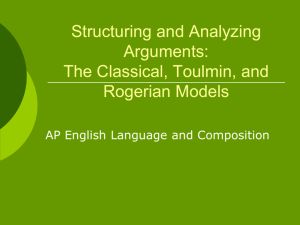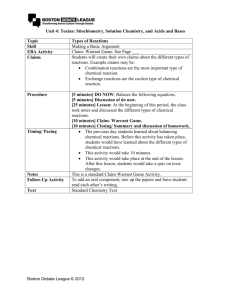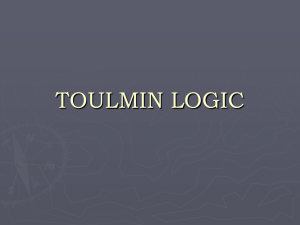Argument - Everglades High School
advertisement
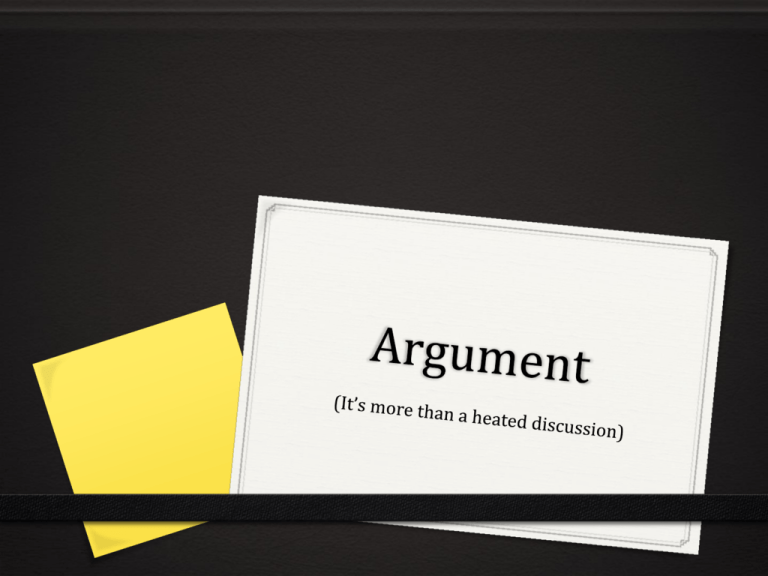
What is an Argument? ar·gu·ment • an oral disagreement; verbal opposition; contention; altercation. • a discussion involving differing points of view; debate. • a process of reasoning; series of reasons. • a statement, reason, or fact for or against a point. • THE MAIN IDEA- BACKED UP WITH EVIDENCE THAT SUPPORTS THE IDEA. Where does it fit?- The proper goal of argument is to use rhetoric to persuade for good reasons- to create good arguments. RHETORIC PERSUASION ARGUMENT Toulmin Model of Argument • Stephen Toulmin is the “Father of Argument” • British, 1922-2009 • The “Toulmin Model of Argumentation” has six components: • Claim • Warrant • Data • Impact • Rebuttal Toulmin/Common Core Made Easy Claim: What do I think/want you to believe at the end of the speech/essay Warrant: How do I know this true/the underlying reasoning that makes sense of the claim in light of the data- links the claim and the data Data: What expert/information do I have that proves this is true Rebuttal: Anticipate possible objections to your claim and insert responses Impact: Why do you/ the listener/reader care that this is true Toulmin’s Example In The Uses of Argument (1958): • Claim: Thesis/Conclusion whose merit must be established. For example, if a person tries to convince a listener that he is a British citizen, the claim would be "I am a British citizen.” • Warrant: The statement authorizing our movement from the data to the claim- the inferential leap that connects the claim with the data. In order to move from the claim, "I am a British citizen," to the data, the person must supply a warrant to bridge the gap between 1 & 3 with the statement "A man born in Bermuda will legally be a British Citizen.” • Data: The facts we appeal to as a foundation for the claim. For example, the person introduced in 1 can support his claim with the supporting data, "I was born in Bermuda.” • Impact: The impact is why the argument matters- consider the audience here! “Citizens of Britain can travel to the US without burdensome red tape.” Example • Example from John Gage’s The Shape of Reason: • Claim: Congress should ban animal research (claim #1) because animals are tortured in experiments that have no necessary benefits for humans, such as the testing of cosmetics (data). The well being of animals is more important than than the profits of the cosmetics industry (warrant). Only Congress has the authority to make such a law (warrant) because the corporations can simply move state to state to avoid legal penalties (data). The use of animals for research is unnecessary cruelty that does not benefit humans, harms animals and is immoral. As such, it diminishes our society’s claim to morality. Example: Direct Postal Service reports $5.2B loss in 3rd quarter By ASSOCIATED PRESS |7/9/12 9:35 AM EDT WASHINGTON (AP) — The nearly bankrupt U.S. Postal Service on Thursday reported a quarterly loss of $5.2 billion and warned it will miss another payment due to the Treasury, just one week after its first-ever default on a payment for future retiree health benefits. From April to June, losses were $2.1 billion more than during the same period last year. The mail agency said it is being hurt significantly by mounting costs for future retiree health benefits. Those expenses made up $3.1 billion of the post office's quarterly loss. Declining first-class mail volume also contributed to losses. "We have simply reached the point that we must conserve cash," Thurgood Marshall Jr., chairman of the Postal Service's board of governors, said in explaining the payment defaults. He cautioned that the mail agency may have to delay other payments if necessary but that day-to-day mail service will not be impacted in any way. The Postal Service for months has been urging Congress to pass legislation that would allow it to eliminate Saturday mail delivery and reduce the annual health payment of more than $5 billion. The post office defaulted on that payment last week after the House failed to take action before heading home for a five-week break. Claim: The U.S. Post Office needs help from Congress. Warrant: They are nearly bankrupt with mounting costs for retiree health benefits and decline in first-class mail. Data: $5.2B losses in 3rd quarter Impact: Postal service will be disrupted, harming Americans personally and financially. Example: Inferred Claim: Airport security is infringing on rights. Warrant: Liberty is being threatened by TSA practices. Data: TSA requires invasive scans or pat downs to pass through security. Impact: Our rights are being impinged upon Simple Example Claim = My parents should allow me to go to my friend’s party on Friday night. Data = The parents of nearly all of the seniors at NHS have given their children permission to attend this party. Warrant = My parents should act in accordance with the other parents of juniors at CHS. Uh-oh, a potential snag… What if my parents don’t “buy” my warrant? What if they don’t think they should necessarily do what other parents are doing? How can I still get permission to attend the party? Or at least have a better chance of getting permission? Uses for Argument • Academic Essays • Debates/Speeches • Conversations/General Logic “Argumentation is thus not a way of ARRIVING AT IDEAS, but rather a way of TESTING IDEAS CRITICALLY.” -Stephen P. Toulmin, 2001
